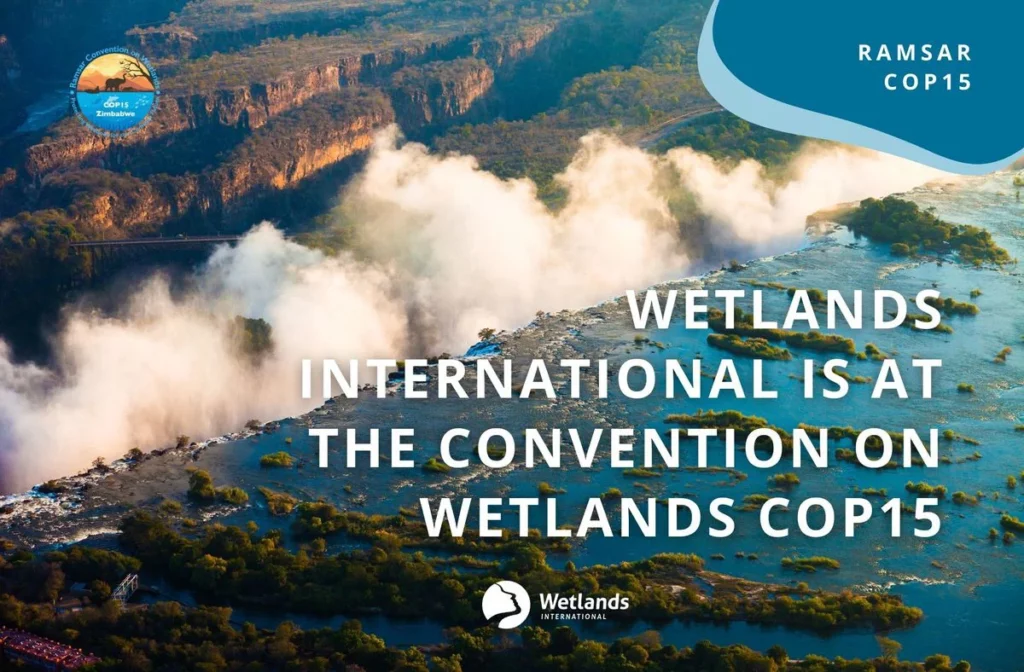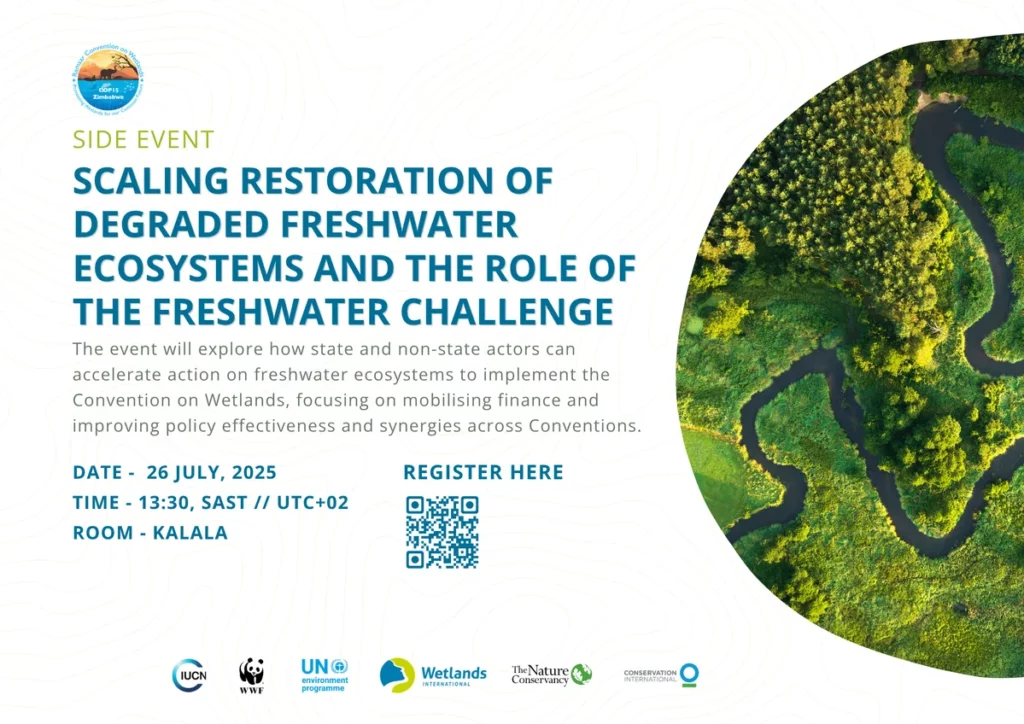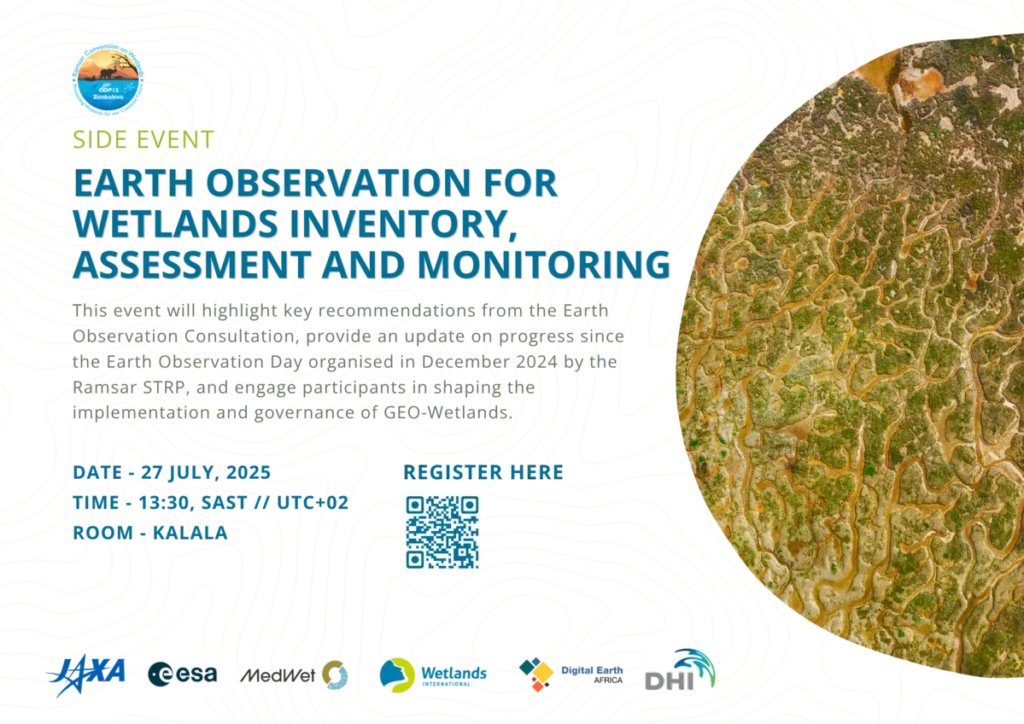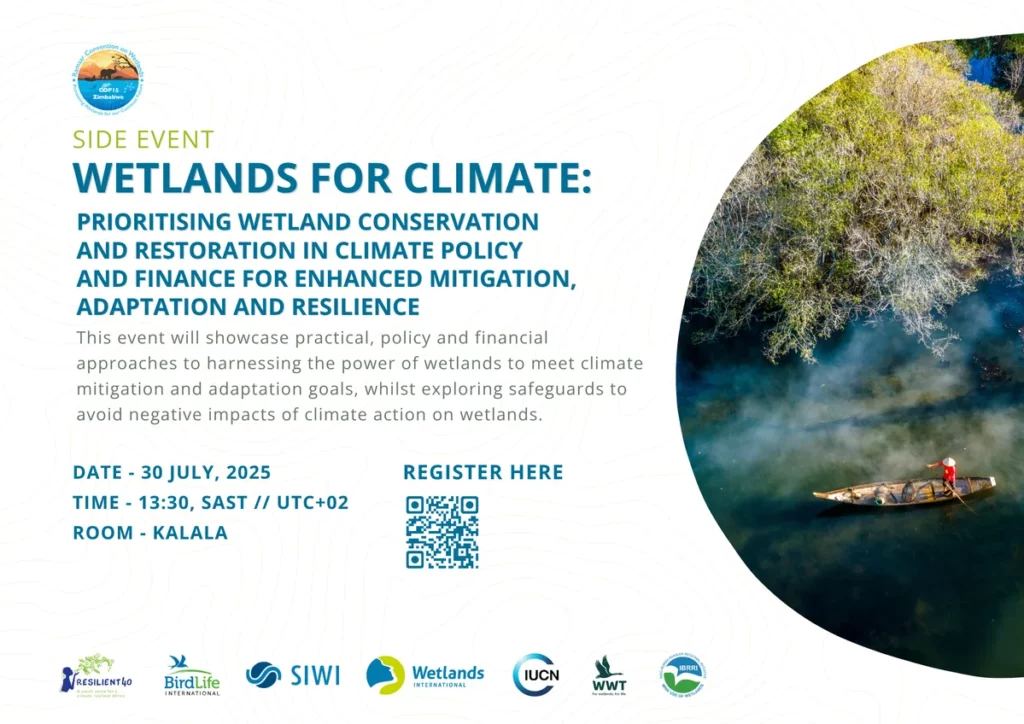
Ramsar Convention on Wetlands COP15
Event | 23–31 July 2025 | Victoria Falls, Zimbabwe

Protecting Wetlands for Our Common Future
The 15th Meeting of the Conference of the Contracting Parties to the Ramsar Convention on Wetlands (COP15) is more than a policy platform—it’s a global moment of reckoning for one of Earth’s most vital ecosystems.
Set against the dramatic backdrop of Victoria Falls, this year’s COP15 unites governments, scientists, civil society, youth, and the private sector under the banner “Protecting Wetlands for Our Common Future.” The urgency is clear: wetlands are disappearing at alarming rates, and the cost of inaction is growing heavier for both people and planet.
Our organisation joins this critical conversation as an active contributor, standing for the science, stories, and solutions that wetlands need now more than ever.
A Turning Point for Wetland Action
COP15 will see the adoption of the 5th Strategic Plan of the Convention on Wetlands—a roadmap that will guide global wetland efforts through the next decade.
We are advocating for a bold, measurable, and integrated strategy that:
- Aligns with the Kunming-Montreal Global Biodiversity Framework (GBF) and the SDGs
- Provides clear targets and indicators for action
- Strengthens the capacity of countries and communities to implement change
Wetlands are no longer peripheral—they are central to tackling the intertwined crises of climate change, biodiversity loss, and water insecurity.
Where You’ll Find Us at COP15
We’re engaging across a wide array of high-level and technical sessions. Below is a selection of key side events we are leading or contributing to.
Featured Side Events:
Scaling Restoration of Degraded Freshwater Ecosystems
Date: 26 July | Time: 13:30 | Venue: Room Kalala
Exploring the Freshwater Challenge as a global accelerator for restoration, this session brings together national and regional leaders to discuss policy innovation, financing, and cross-sector partnerships.

Earth Observation for Wetlands Inventory, Assessment and Monitoring
Date: 27 July | Time: 13:30 | Venue: Room Kalala
From space to policy: This event showcases how Earth Observation tools are transforming how we monitor, report on, and protect wetland ecosystems. A key moment to shape the future of GEO-Wetlands governance.

Wetlands for Climate: Prioritising Wetland Conservation and Restoration in Climate Policy and Finance
Date: 30 July | Time: 13:30 | Venue: Room Kalala
Wetlands as nature’s climate infrastructure—this session highlights financing mechanisms, policy tools, and safeguards for placing wetlands at the heart of national and global climate strategies.

Waterbird Population Estimates and the Global Waterbird Populations Partnership
Date: 30 July | Time: 18:30 | Venue: Room Kalundu
Unpacking population data, flyway collaborations, and voluntary commitments that support the global tracking and protection of waterbird species.
Additional Side Events Featuring Our Contributions:
- Mobilising Innovative Financing for Wetlands | 26 July, Room Kalala
- Connecting Wetlands, Flyways, People and Institutions | 25 July, Room Matetsi
- Rights of Nature in Wetlands | 28 July, Room Kalundu
- Capturing Climate Adaptation Co-Benefits of Wetlands | 30 July, Room Gwayi
- National Wetlands Inventories: Tools, Challenges and Opportunities | 26 July, Room Kalundu
- Delivering Science to Support the Convention – STRP Priorities | 27 July, Room Gwayi
- Wetlands at Risk: Tools and Policies for Safeguarding Ecological Character | 28 July, Room Gwayi
- Empowering Youth for Wetland Conservation and Sustainable Development | 30 July, Room Gwayi
- Regional Collaboration for South Asian Wetland Conservation | 30 July, Room Kazuma
The Big Picture: Our Priorities at COP15
Across all sessions, we’re driving conversations around:
- Evidence-based action grounded in local context and global relevance
- Financing that works for nature and people, especially vulnerable communities
- Technology and data to improve monitoring and accountability
- Legal and policy frameworks that elevate wetlands within national agendas
- Community-led models that integrate conservation with cultural values and livelihoods
- Youth leadership, knowledge exchange, and intergenerational dialogue
Learning, Sharing, Leading
Beyond plenaries and panels, we are making space for stories—stories of resilience, innovation, and the lived experiences of those protecting wetlands on the ground. From restoration in mangrove villages to citizen science tracking bird populations, the lessons shared at COP15 are not just policy inputs—they are lived blueprints.
Stay Connected
For daily highlights, updates from the field, and reflections from our team:
- Follow our LinkedIn page
- Read the official Wetlands International event blog
